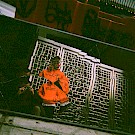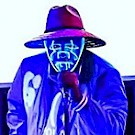 Matt Dorrien aka Snowblind Traveler: Photo by Kim Smith Miller
Matt Dorrien aka Snowblind Traveler: Photo by Kim Smith MillerSerendipity is a funny thing. Paranormal in its susceptibility to the intangible, like it or not, the threads that weave together the stuff that helps our lives along is hard to pin down. Matt Dorrien's journey as a songwriter, it seems, is bubbling with those serendipitous juices—so injected with historical obsessions and temporal menageries of fancy and wonder are his songs that it's easy to be swept away to a realm you're not altogether familiar with, yet you're happy to have arrived at nevertheless.
Serendipity, in all its mysterious coincidences, has lead Dorrien to the City of Roses, where despite―or perhaps because of―his wanderlust, he's very quietly just released his sophomore album. It also happens to be one of the best Portland releases of the year.
 Photo Robbie Augspurger
Photo Robbie AugspurgerDorrien—aka Snowblind Traveler, the moniker he's performed under for the past three years― has enjoyed a substantial incubation period just under the radar on both the East and West Coasts. Originally from Long Island, N.Y., Dorrien's muses took on ambitious forms early on when he decided to commit his craft to songwriting in the vein of his heroes from Greenwich Village of the 1960s. His new LP, Confederate Burial, emerges as a sort of homage to the inclusive, far-ranging influences of artists like Bob Dylan, The Beatles, Harry Nilsson and Neil Young.
Even at a young age, Dorrien says he could hear those influences beckoning him.
“I remember hearing ‘Strawberry Fields’ for the first time and the production of that song, the way it sounded to me, was ethereal,” Dorrien says. “It blew my mind—I couldn’t understand what was going on.”
Confederate Burial swims in rough seas of satire, allegory and ambitious literary prose. The name Snowblind Traveler was swiped from Dylan Thomas' famed work A Child's Christmas in Wales, and bewitching compositions like Dorrien’s song “Winter Wren” are anchored in his own adaptations of books he's read.
“I read In the Heart of the Sea about the tragedy of the whaleship Essex,” Dorrien explains. “There were three whaling boats and they were lost at sea for [some months] and purposely navigated away from these islands in the South Pacific because, in their ignorance, they thought they were cannibalistic islands.”
The irony of the story, Dorrien continues, is that the crew all turned to cannibalism in order to survive, with only a few managing to do so. On “Winter Wren,” breezy mandolins flutter above early American folk pentatonic guitar lines and motorik tribal drumming, Dorrien singing, “Winter wren, whom do you sing for? / The cabin boy drew the shortest straw / His marrow fed the starving crew underneath the hollow moon.”
It is bleak imagery, certainly, and a testament to Dorrien's weary brand of Appalachian folk. This approach lies in decidedly stark contrast to the trajectory of his mostly Americana debut, Lost On The North Hills. And while that first album is in and of itself a terrifically composed sliver of Dorrien's lovelorn oeuvre, it's nowhere near the eerily endearing nature of the tragic melodramas found on Confederate Burial. It's Dorrien's ability to twist these sad tales into somehow jaunty missives on the unpredictability of life that vault him in with surreal satirists like Nilsson.
“With Lost On The North Hills, I was really exploring all these different styles of songwriting and ways of producing,” says Dorrien, who recorded both albums in San Francisco (where he moved to Portland from a little over a year ago) at Papercuts maestro Jason Quever's home studio. “I had access to this studio and a bunch of cool equipment. We kind of just went at it, and I think it’s a very eclectic mix of songs. With Confederate Burial, I was really trying to hone in on one type of style and sound for the album, to make it sound a little more organic. I also wanted it to be a darker album, which it is. There’s a lot of mordant, satirical songs in there, and very macabre, harrowing tales."
TO READ THE REST OF THIS STORY, SUBSCRIBE TO OUR NEWSLETTER...
A PDF of the second issue of Vortex Music Magazine will be delivered to your inbox!





